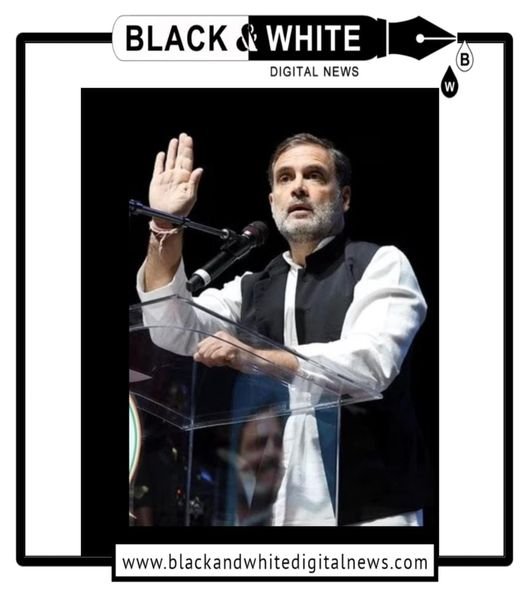Rahul Gandhi’s U.S. Speech on RSS Triggers Political Firestorm; BJP Labels It a “Dangerous Narrative
||Black and White Digital News ||
||September 11,2024||
Rahul Gandhi’s recent speech in the United States, particularly his sharp criticism of the Rashtriya Swayamsevak Sangh (RSS), has sparked a significant political controversy, drawing fierce reactions from the Bharatiya Janata Party (BJP). During a four-day visit to the U.S., Gandhi addressed a gathering in Herndon, Virginia, where he voiced concerns about the treatment of religious and linguistic minorities in India. His statements, which implied that the RSS promotes the idea of some religions and cultures being “inferior,” ignited a strong backlash from the BJP.
Key Points from Gandhi’s Speech:
RSS Criticism: Gandhi accused the RSS of creating divisions based on religion, language, and culture, stating that the organization’s ideology views certain communities and languages as inferior. He extended his concerns to Sikh and other religious minorities, questioning whether their freedoms, such as wearing religious symbols like turbans, would be safeguarded in India.
Identity and Unity: Gandhi emphasized that the core issue in Indian politics was not merely political but about the identity and freedoms of minorities. He framed the battle as one concerning whether India would continue to uphold its pluralistic values, which allow people from different religious and cultural backgrounds to coexist freely.
Targeting BJP and Modi: Gandhi also took aim at the BJP and Prime Minister Narendra Modi, claiming that the recent electoral results have diminished the BJP’s dominance. He referred to Modi’s projected image of strength as being shattered, a remark that drew sharp reactions from the ruling party.
BJP’s Retaliation:The BJP was quick to respond. Union Minister Hardeep Singh Puri, a prominent Sikh leader, held a press conference at the party’s headquarters, condemning Gandhi’s comments. He pointed to the 1984 anti-Sikh riots, which occurred during the tenure of Rajiv Gandhi, Rahul Gandhi’s father, as a time when the Sikh community faced real existential threats. Puri’s comments suggested that the Gandhi family had historically contributed to divisive and dangerous policies against minority communities, a narrative the BJP has used previously to counter Congress’s critique of communalism.
Sikh Pogrom: Puri referenced the 1984 riots, highlighting the violence Sikhs endured following the assassination of Indira Gandhi. The BJP used this incident as an example of how the Congress leadership failed to protect minority rights during critical moments in Indian history.
“Dangerous Narrative”: Puri accused Gandhi of fostering a narrative that could threaten national unity, particularly by discussing sensitive domestic issues on foreign soil. He noted that Gandhi’s portrayal of India’s diversity as being under threat by the RSS-BJP alliance is part of an attempt to “set a dangerous narrative.”
Anti-Reservation Allegation: In a separate response, BJP leader Ravi Shankar Prasad criticized Gandhi for suggesting that reservations could be reconsidered when India becomes “a fair place.” Prasad linked this to the Congress’s historical stance on reservations, stating that the Nehru-Gandhi family had consistently opposed affirmative action policies. He cited examples from the Mandal Commission era, where the Congress had resisted pro-reservation policies.
Rahul Gandhi’s criticism of the RSS abroad has been a consistent element of his international speeches, where he presents himself as a defender of India’s secularism and pluralism. By framing the RSS as an organization that promotes inequality, Gandhi seeks to reinforce his position as a challenger to what he perceives as the BJP’s majoritarian politics. However, the BJP’s counterattack, especially by invoking the sensitive 1984 riots, seeks to undermine Gandhi’s credibility as a protector of minority rights.
Gandhi’s remarks also highlight a broader Congress strategy of positioning itself as a defender of India’s constitutional values, hoping to win over minority communities that may feel alienated under the current regime. However, the BJP has masterfully countered such efforts by resurrecting past incidents where Congress-led governments were accused of failing to protect minority rights.
Rahul Gandhi’s U.S. speech has unleashed a new round of political clashes between the Congress and BJP, with the latter accusing him of attempting to undermine national unity. By invoking the 1984 anti-Sikh riots, the BJP has tried to turn the debate around, questioning the Congress’s historical record on minority protection. As the political battle intensifies, Gandhi’s remarks have provided the BJP with ammunition to counter Congress’s critique of the Sangh Parivar, with both sides framing the narrative as one about India’s identity, unity, and commitment to secularism.



